
An Evening Out in Goris: Running to Catch the Last Bus Home
By Mariam Matevosyan
“Every time when I go to theater or another evening event, I have to leave early to make to the last 6:30pm bus for the return trip home,” says Goris resident Nelly.
There are four public bus routes in the city of Goris. The minivans plying these routes run from 8am to 6:30pm, except Sundays and holidays. Public transportation doesn’t even operate on New Year’s Day when many are visiting family and friends.
According to the RA Government Resolution No. 762, city public transportation in Goris is managed by the municipality and also is responsible for establishing the routes and bus schedules.
“Out of five routes planned for the city of Goris, only four are currently operational. Buses for the four routes are provided by Last and Samuel Trans companies, each of which has two minivans. The fifth route is currently not in service since no other transportation company has submitted a bid for the transportation contract,” says Goris Deputy Mayor Tigran Barkhoudaryan, who also serves as president of the city’s Commission of Competitive Bidding.
It has been eight years since Last has started providing passenger service. “The last bidding process took place on April 2012 and our company won the contract for the next three years. We work from 8:30am to 6:30pm on a regular schedule on a half-hour frequency,” says company president Smbat Arzoumanyan. According to him, buses often run behind schedule due to lack of passengers. Arzoumanyan also notes that buses with the capacity of 13 people often run with 20 or more passengers on board.
The schedules of the city’s public transportation system are set by the Commission for Competitive Bidding, headed by the mayor. Although the hours of operation established by the mayor are between 8am and 9pm, in reality public transportation runs only until 6:30pm.
One might ask why the buses don’t run according to the established schedule.
“Each bus should run the route 18 times during the work day. However, the last three runs are completed with higher frequency because the demand for buses is higher during the evening rush hour.”
This means that while the schedule developed and adopted by the municipality prescribes hourly runs, the bus companies make more frequent runs to achieve higher profitability.
“In addition to the standard eight work hours, the law allows us to operate four hours of overtime. However, our company cannot afford overtime payments,” says the director of Last.
Translated by Alex Klyuev
 Videos
Videos Photos
Photos




Write a comment